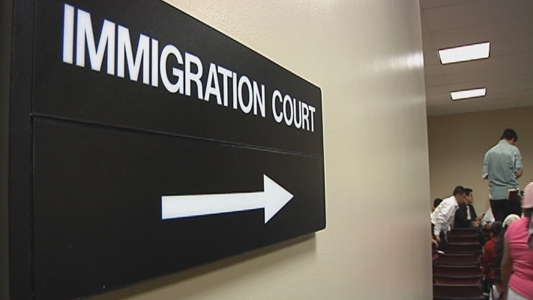
By Allie Robertson, Legal Assistant and AVODAH Fellow, Capital Area Immigrants’ Rights (CAIR) Coalition
It was a crisp October morning as my coworkers, volunteers and I headed inside Hampton Roads Regional Jail with our folders full of intakes and informational guides for yet another batch of newly detained immigrants. As the group filed into the gymnasium, we set up for a presentation and intake. Amidst the organized chaos of detainees, CAIR Coalition staff, and volunteers, we began speaking with individuals and conducting intakes and evaluations.
I approached a young man who was waiting patiently for his turn to speak with a CAIR Coalition representative. Daniel* was reserved, quiet and a bit hesitant as he explained to me his fear of returning to El Salvador. He explained that he has been in the U.S. for 8 years, has a life here, and was afraid of the gangs in El Salvador. From this initial conversation, it did not appear to me that he had a strong case against deportation, because U.S. immigration law does not provide protection for fear of generalized country-wide violence. Given that individuals are not appointed representation in immigration court, Daniel was faced with the daunting decision of whether to be his own attorney or face deportation and life threatening conditions in El Salvador. I gave him some reading materials to help guide his decision process and explained that the decision of whether or not to fight his case was completely up to him.
Two weeks later I met with Daniel again at Hampton Roads. After reading our asylum information packets, he decided that he wanted to fight his case. Unfortunately, given CAIR Coalition’s limited resources, we are not always able to find an attorney to assist individuals who want to fight their cases. We do, however, provide them with pro se assistance, which can include copies of sample applications, a bit of research done on their behalf, and group workshops explaining immigration processes and procedures. I ensured he understood that he would be detained for months during the court process, and would represent himself “pro se,” meaning he would be his own an attorney, and he agreed to proceed.
As the weeks went by, I worked with Daniel and learned that there was more to his case than I had originally thought. During one of our meetings, Daniel explained that here in the U.S. he had witnessed a crime involving gang members, and that the gangs had threatened to kill him if he divulged this information to the authorities. Despite these threats, he had informed authorities about the crime and about gang activity in the area, and as a result had obtained protection from local authorities. He feared that this same protection from gang violence would not be available to him in El Salvador. It was clear that he was so scared to share this information with me while in the jail, surrounded by strangers. He then explained that he was suffering from depression and anxiety as a result of multiple death threats. I contacted Daniel’s mother, brother, and probation officer, and requested mental health treatment records in order to obtain as much information possible in support of Daniel’s story. Through this research, I was able to hone in on supporting evidence for Daniel’s case and help him paint a picture of his story for the judge. Finally, after eight months in immigration detention, Daniel went to court to fight his case. Daniel reported back to me, by calling through CAIR Coalition’s “detention hotline,” and explained that he was given another hearing date because the judge was interested in hearing testimony, and therefore subpoenaed Daniel’s probation officer and authorities.
It was a week of nail-biting back-to-back hearings while the judge contemplated his decision. In the end, Daniel was finally granted withholding of removal. Withholding of removal is a type of protected status, similar to asylum, allowing individuals to live and work in the U.S. legally.
I am very proud of my work assisting Daniel with his case, and proud of Daniel for fighting his own case as well. He suffered for over eight months in Immigration and Customs Enforcement detention with no communication with his family, and all the while continued to suffer from depression, anxiety and Post-Traumatic Stress Disorder. There are thousands of people suffering in detention and facing deportation without legal guidance or representation. Daniel stands out in that he felt ready to fight an uphill battle on his own. Many people in this position feel intimidated, frightened and discouraged from representing themselves, and resort to signing their own deportation orders. If Daniel was able to fight his own case and succeed on his own, I can only imagine how many people would find success if guided and represented through the complex immigration system. Each of these individuals without a lawyer has a story to tell, each with different challenges, tragedies and triumphs.
I urge you to take action to support due process for all immigrants, through a 30 second letter to Congress.
*Pseudonym used to protect privacy.
